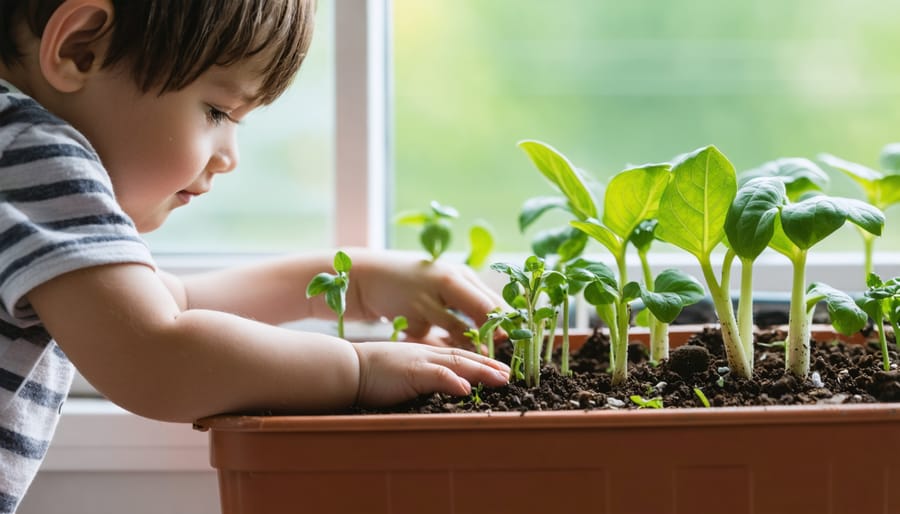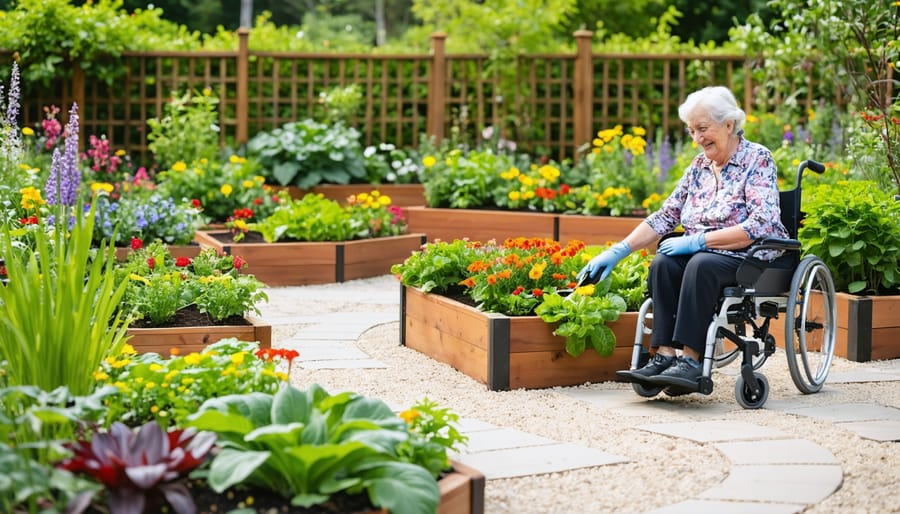Digging your hands into rich soil and nurturing plants does more than just beautify your surroundings – it’s a powerful pathway to better health. Research shows that gardening can cultivate joy and well-being while providing a full-body workout that burns up to 330 calories per hour. Beyond the physical benefits of improved strength, flexibility, and cardiovascular health, tending a garden reduces stress hormones and boosts mood-enhancing serotonin levels. Studies from the National Institutes of Health confirm that gardeners typically maintain healthier weights, stronger immune systems, and better mental health compared to non-gardeners. Whether you’re growing vegetables in a small patio container or maintaining a sprawling flower garden, this rewarding activity connects you with nature while delivering profound benefits for both body and mind. The evidence is clear: gardening isn’t just a hobby – it’s a holistic health practice backed by science.
Physical Health Benefits That Surprise Most Gardeners
Natural Exercise That Doesn’t Feel Like Work
One of the best things about gardening is how it transforms exercise into an enjoyable activity. While you’re tending to your plants, you’re actually engaging in a full-body workout without the monotony of a gym routine. Digging, planting, weeding, and watering can burn between 200-400 calories per hour – comparable to a moderate gym session!
Each gardening task targets different muscle groups. Pulling weeds strengthens your core and upper body, while squatting to plant seedlings works your legs and glutes. Pushing a wheelbarrow or carrying watering cans builds arm strength and improves balance. Even simple tasks like reaching for tools or pruning overhead branches enhance flexibility and range of motion.
What makes gardening particularly effective as exercise is its varied nature. You’re constantly changing positions and movements, which prevents muscle fatigue and keeps your body engaged. Plus, the satisfaction of watching your garden grow makes you more likely to stick with it compared to traditional exercise routines.
For older adults or those with joint issues, gardening can be especially beneficial as it’s a low-impact activity that can be adjusted to individual comfort levels. Remember to warm up before starting and use proper posture to maximize benefits while preventing strain.

Vitamin D and Bone Health Benefits
One of the most significant health benefits of gardening comes from something we can’t even see – vitamin D production. When you spend time tending to your garden under the sun, your body naturally produces this essential nutrient, often called the “sunshine vitamin.” Just 30 minutes of gardening in the morning or late afternoon can help meet your daily vitamin D requirements.
This vitamin plays a crucial role in maintaining strong, healthy bones by helping your body absorb calcium more effectively. Without adequate vitamin D, you might be at risk for bone-related conditions like osteoporosis or increased susceptibility to fractures. Gardening provides a perfect opportunity to get your daily dose while engaging in an enjoyable activity.
However, it’s important to practice safe sun exposure while gardening. Wear appropriate sun protection, including lightweight, long-sleeved clothing and a wide-brimmed hat, and try to schedule your gardening sessions during the gentler morning or late afternoon hours. This way, you can maximize the vitamin D benefits while protecting your skin from harmful UV rays.
For older adults especially, the combination of vitamin D production and weight-bearing garden activities creates an ideal environment for maintaining bone density and overall skeletal health.
Mental Wellness Through Garden Therapy
Stress Relief in Your Garden Sanctuary
When you step into your garden, you’re entering a natural stress-relief zone. Research has shown that gardening significantly reduces cortisol, our body’s primary stress hormone. Just 30 minutes of gentle gardening activities can lower stress levels more effectively than many indoor relaxation techniques.
The combination of fresh air, natural sunlight, and the rhythmic nature of gardening tasks creates a meditative state that helps calm an overactive mind. Whether you’re pulling weeds, planting seedlings, or simply tending to your flowers, these repetitive actions help you focus on the present moment, much like mindfulness practices.
The garden provides a perfect escape from digital devices and daily pressures. Many gardeners describe feeling a sense of peace while working with soil and plants. This connection with nature, often called “grounding,” has been scientifically proven to reduce anxiety and improve mood.
Even the soil itself contains beneficial microorganisms that can boost serotonin levels – our body’s natural feel-good chemical. By creating your own garden sanctuary, you’re investing in a natural stress management tool that keeps giving back season after season.
Mindfulness and Mental Clarity
Gardening offers a unique pathway to mental clarity through its naturally meditative qualities. As you tend to your plants, the rhythmic actions of weeding, pruning, and planting create a sense of flow that helps quiet the mind. Many gardeners report experiencing a state similar to meditation while working in their gardens, where daily stresses seem to melt away.
This mindful engagement with nature has been shown to reduce cortisol levels, the body’s primary stress hormone. Whether you’re carefully transplanting seedlings or mindfully observing the healing power of zen gardens, gardening provides countless opportunities for peaceful contemplation.
The focused attention required for gardening tasks helps train your mind to stay present, much like traditional meditation practices. Simple activities like feeling the soil between your fingers or listening to leaves rustling in the breeze naturally encourage mindfulness. This mental engagement, combined with the satisfaction of nurturing living things, creates a powerful recipe for improved mental clarity and emotional well-being.

Nutritional Benefits of Growing Your Own Food

Fresh-Picked Nutrition
When you grow your own vegetables, you’re not just saving money – you’re harvesting superior nutrition right from your backyard. Home-grown produce typically contains higher levels of vitamins, minerals, and antioxidants compared to store-bought alternatives. This nutritional advantage comes from harvesting at peak ripeness and the shorter time between garden and table.
Freshly picked vegetables retain more nutrients because they don’t endure long transportation and storage periods. For instance, homegrown tomatoes can contain up to 30% more vitamin C than their supermarket counterparts. Leafy greens like spinach and kale lose significant nutritional value within just 24 hours of harvest, making garden-fresh options notably more nutritious.
Additionally, when you control the growing environment, you can choose organic methods that enhance nutrient density. Rich, well-maintained soil leads to more nutrient-dense produce. You also have the freedom to grow heritage varieties that often pack more nutritional punch than commercial cultivars bred for shelf life and appearance rather than nutrition.
The best part? You can harvest exactly what you need, when you need it, ensuring maximum nutritional benefit with every bite.
Organic Growing for Better Health
Growing your own organic produce offers unparalleled control over what goes into your food and, ultimately, your body. When you maintain an organic garden, you eliminate exposure to synthetic pesticides and fertilizers that are commonly used in conventional farming. Instead, you can nurture your plants using natural composting methods, beneficial insects, and organic soil amendments.
This control extends beyond just avoiding chemicals. You can choose heirloom varieties packed with more nutrients than their commercially grown counterparts, pick vegetables at peak ripeness for maximum nutritional value, and ensure your soil is rich in essential minerals that contribute to healthier, more nutritious produce.
Many gardeners report that organic produce tastes noticeably better, which can encourage increased consumption of fresh fruits and vegetables. Plus, knowing exactly how your food was grown provides peace of mind and a deeper connection to what you’re eating. You can experiment with companion planting, natural pest control methods, and various composting techniques to create a thriving, chemical-free garden that produces the healthiest possible food for you and your family.
Social and Community Health Benefits
Gardening isn’t just about growing plants – it’s about growing connections. When you dig into the soil alongside others, you’re cultivating relationships just as much as you’re nurturing your garden. Whether you start a community garden or simply share gardening tips with neighbors, these green spaces become natural gathering points for meaningful social interaction.
Community gardens, in particular, have become vibrant social hubs where people from diverse backgrounds come together with a shared purpose. These spaces foster friendships across generations, cultures, and social groups, creating lasting bonds through the shared experience of watching things grow. Research shows that regular participation in community gardening activities can reduce feelings of isolation and increase social support networks, particularly among older adults.
Gardening also creates opportunities for knowledge sharing and mentorship. Experienced gardeners often take joy in passing down their wisdom to newcomers, while younger gardeners might share innovative sustainable practices with their more traditional counterparts. This exchange of ideas and experiences strengthens community ties and preserves valuable gardening traditions.
Many gardeners report that their hobby has led to lasting friendships through plant swaps, harvest sharing, and garden club memberships. These connections extend beyond the garden itself, creating support networks that contribute to overall well-being. Children who participate in school or community gardens often develop better social skills and a stronger sense of community responsibility.
The social benefits of gardening extend to families as well, providing quality time away from screens and creating shared memories through collaborative projects. Whether it’s planning next season’s crops or celebrating a successful harvest, gardening brings people together in meaningful ways that enhance both individual and community health.
From boosting physical fitness and strengthening immunity to reducing stress and improving mental well-being, gardening truly offers a remarkable array of health benefits. This age-old practice combines gentle exercise, mindful engagement with nature, and the satisfaction of growing your own food into one fulfilling activity. Whether you’re tending to a small collection of herbs on your windowsill or maintaining a flourishing vegetable garden, every moment spent gardening contributes to your overall health and happiness.
The beauty of gardening lies in its accessibility – anyone can start, regardless of experience or space limitations. You don’t need a large backyard or expensive equipment to begin reaping the rewards. Even simple container gardening can provide the physical and mental health benefits we’ve explored throughout this article.
So why not take that first step today? Start small, perhaps with a few easy-to-grow herbs or flowers, and gradually expand your garden as your confidence grows. Your body and mind will thank you for it, and you’ll join millions of others who have discovered the joy and health benefits of this rewarding pursuit. Remember, every expert gardener started as a beginner – your own journey to better health through gardening begins with planting that first seed.




